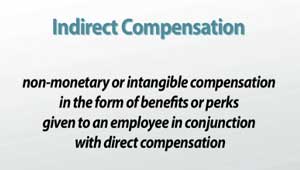Understanding Employee Compensation
After you watch the video and know the material, click HERE for the quiz.
Compensation is pay for services during the course of employment. This can be direct (or monetary) compensation and indirect (or non-monetary) compensation in the form of benefits provided to the employee.
'Show Me the Money' and Other Benefits to Employment
In this lesson, we will explore the ways companies compensate, or pay, their employees for services provided during the course of employment. The compensation can be in a direct (or monetary) form or in an indirect (or non-monetary) form like benefits and perks. Compensation is simply pay for services during the course of employment. An employee performs the duties of his or her job and receives pay and other non-monetary compensation in exchange for performing the job.
Fast Jet Airlines employees are compensated in two forms:
- Direct compensation
- Indirect compensation
Direct Compensation
 |
Fast Jet Airlines utilizes both direct and indirect compensation for employees, depending on their position. Employees are paid either a salary or an hourly wage. Direct compensation is monetary payment for services rendered by an employee. This payment is made in the form of money. Direct compensation can come in two forms: salary or wages.
Fast Jet Airlines pays a set amount of money each pay period to those employees who hold administrative positions like CEOs, managers and administrative staff. These employees are required to work regardless of how busy the airline is on any particular day. These employees are paid a salary.
 |
Fast Jet Airlines pays employees like pilots, ramp agents and flight attendants only for the time they are actually working. These employees work only when there are flights scheduled. These employees are paid wages.
 |
Wages, also known as 'non-exempt,' are another form of compensation and are an hourly dollar amount paid to an employee for each hour he works.
Other Forms of Compensation
Fast Jet Airlines sells pretzels on their flights. Flight attendants are encouraged to sell as many pretzels as possible. If flight attendants sell all of the pretzels on a flight, they are given a special reward - like a pizza party in the airline's VIP lounge. These employees enjoy an incentive.
 |
Incentives, or reward for performance, can be things such as company parties for meeting production or sales goals. They are considered monetary because in some cases monetary compensation is given.
Fast Jet Airline employees also receive additional compensation for going above and beyond the company expectations. For every 30 days that pass without a missing or lost piece of luggage, ramp agents are given an additional $20 in their paychecks. These employees are given a bonus. Bonuses are compensation earned above normal pay for exceptional performance - like meeting a production goal or a sales quota.
Fast Jet Airlines also offers employees the option to buy into the company at a lower price than a non-employee. This is known as stock options. Stock options are a benefit given to employees that carries the right to buy and sell shares of stock in the company. This means employees can, but are not obligated to, buy company stock at a lower price than non-employees. The employee also has the right to sell his or her shares of company stock.
Monetary compensation is only part of attracting and retaining good employees. There are other important compensation factors that are non-monetary but are equally important.
Indirect Compensation
Fast Jet Airlines provides its employees with many other forms of compensation. Benefits like free flights and free meals are given in addition to money. This makes employment with the airline very attractive.
 |
Indirect compensation is non-monetary, or intangible, compensation in the form of benefits or perks given to an employee in conjunction with direct compensation. Some types of indirect compensation, also known as benefits or perks, provided to employees include:
- Health and life insurance
- Social Security benefits
- Retirement plans like 401K
- Paid time off
- Flexible schedules
- Telecommuting or work-from-home options
- Uniforms
- Meals
- Flights
- Hotel discounts
These benefits have no monetary value, meaning an employee cannot liquidate these benefits into cash, but they enhance the direct compensation.
Lesson Summary
In summary, compensation is being paid for services during the course of employment. There is direct compensation (or monetary compensation) and indirect compensation (or non-monetary compensation) in the form of benefits provided to the employee.
Direct compensation is monetary payment for services rendered by an employee. This can be either a salary or hourly wages. A salary is a set amount of money paid to an employee for services performed. Employees on a salary are exempt and can expect to earn the same amount of money each pay period. A wage is an hourly rate of pay given to an employee for services performed. Non-exempt employees receive wages and can expect to earn an hourly wage for each and every hour they perform.
Other forms of compensation include incentives and stock options. Incentives are rewards generally given to employees when company goals are met - like sales quotas or performance goals. These rewards can be a company party or extra money. Stock options, which are a benefit given to employees, carry the right to buy and sell shares of stock in the company.
Indirect compensation is non-monetary, or intangible, compensation in the form of benefits or perks given to an employee in conjunction with direct compensation. This is compensation that has no cash value but benefits an employee. Health and life insurance, Social Security, retirement plans, flexible scheduling and even discounts for products and services are just some of the non-monetary benefits many employees receive.